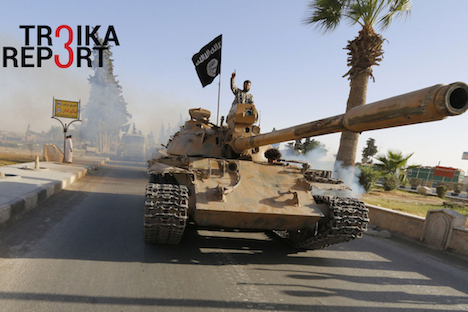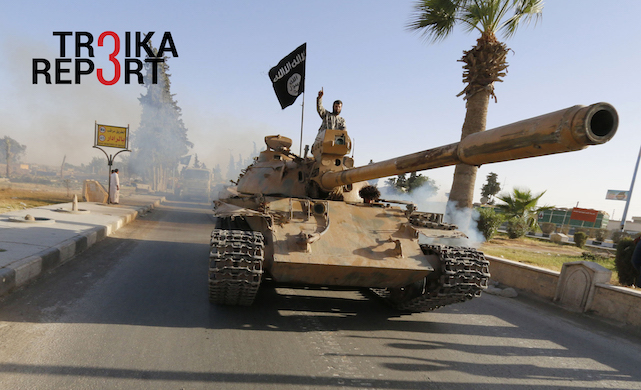

Militant Islamist fighters on a tank take part in a military parade along the streets of northern Raqqa province June 30, 2014. Source: Reuters.
Despite a barrage of Western criticism over Russia’s attacks, which are allegedly targeting the Syrian opposition instead of ISIS, Russia’s military officials and observers insist the air strikes are proving effective so far.
In the face of such a decisive move by Russia, U.S. President Barack Obama announced a strategic plan to launch a general offensive on the de facto capital of ISIS, the north-eastern Syrian city of Raqqa. The operation would involve deploying 20,000 Kurdish fighters and some 5,000 rebels representing the Syrian opposition, and be backed up with U.S. Air Force support.
Obama’s initiative to launch major offensive on ISIS positions in Syria, not attempted during more than a year of the existence of the U.S.-led coalition, has merely aggravated the rift between Moscow and Washington over the strategy of fighting ISIS. There are suspicions among Russian observers that the plan could be nothing more than a show of resolve and competence for the sake of “not being outdone” by the Russians.
Meanwhile, the second anti-ISIS coalition-in-the-making, comprising Russia, Iran, and Iraq along with Damascus, is showing its own resolve to emerge as a new force against ISIS. The new coalition is setting up a coordination center in Baghdad to carry out reconnaissance and analysis, with the unit due to begin operation in the coming weeks.
A newcomer to the second anti-ISIS coalition, led by Moscow, Iraq is making bold commitments. Seen as a U.S. client-state after more than a decade of American military presence in the country since the demise of dictator Saddam Hussein, Iraq has pledged to become more active in fighting ISIS and provide intelligence data to Iran, Syria, and Russia.
Meanwhile, the international reaction to Russia’s military actions ranges from total rejection (Saudi Arabia and Turkey) to cautious admittance of possible cooperation (France) and an attitude of benign neglect (the United Arab Emirates).
Unexpectedly, the Emirates welcomed Russian involvement, saying that they had no reservations about it. A senior official in Abu Dhabi, quoted by French daily Le Figaro, said if the Russians manage to weaken the ISIS and al-Nusra radical groups, it would be considered by the UAE as “positive.” Moreover, the country are not even concerned if Russia’s steps end up prolonging the rule of Bashar al-Assad: “We have no problem in cooperating with Russia,” said the unnamed official, “but not with Iran.”
On the whole, since Moscow got involved in the Syrian conflict the changes in the configuration of political alliances and loyalties have accelerated. Still, this does not pave the way for a truly wide and comprehensive alliance.
The two anti-ISIS coalitions are not entirely on speaking terms, despite top-level liaison between Russian and American military officials. There is enough rhetoric in the air to suggest that the two alliances are in competition with each other, each de facto claiming supreme legitimacy as the principal anti-ISIS force.
Could this vanity fair hamper the fight against ISIS and other radicals that are jeopardizing regional stability? Dmitry Polikanov, member of the board of the Moscow-based Center for Policy Studies in Russia, an independent think tank, provided a comment for Troika Report.
“It could lead to uncoordinated efforts and, moreover, to clashes between members of different coalitions — not deliberately but unintentionally. I assume that it would be better for both coalitions to have a pact preventing harm being inflicted upon one another. Russia and the U.S. should have an agreement to make their actions more… wise, I would say.
“Right now, Barack Obama has proclaimed the necessity to provide more weapons to the Syrian rebels. As we know, recently such armaments were transferred from the rebels to the terrorist groups; this would eventually hamper the operations conducted by Russia.”
— ISIS is identified as a global threat, as a global challenge. It requires global efforts to eradicate this danger. Why is there no coordination between Russia and the West at this critical point?
“This is due to the lack of political will on the part of the West. The Russian government has repeatedly called on joint efforts to combat Islamic State. All attempts have failed, unfortunately. It could be motivated by the personal ambitions of certain leaders.”
— Can at some point in time one of the coalitions proclaim itself the winner?
“Actually, there can barely be a winner in this war. It would be dangerous to claim to be the victor. ISIS, like many other terrorist organizations, is a network organization. It is practically impossible to achieve complete victory. I think it would be more reasonable to speak about the process but not the result. The goal of Russia and its allies and the U.S.-led coalition should be to minimize the combat potential of ISIS.”
Basically, the undeclared competition between the two coalitions will determine not so much the winner over ISIS but the new pecking order in the region.
For the United States it is becoming a matter of re-instating its credentials as the time-honored provider of security for the Middle East. For Russia, it is about securing a pro-Moscow regime in Damascus, establishing privileged relations with the rising regional power, Iran, and also coming back into global politics as an assertive agent to be reckoned with.
Despite this drastic discrepancy in strategic interests, the over-arching goal for both is evident: ISIS has no place in the civilized world.
The opinion of the writers may not necessarily reflect the position of RBTH or its staff.
All rights reserved by Rossiyskaya Gazeta.
Subscribe
to our newsletter!
Get the week's best stories straight to your inbox